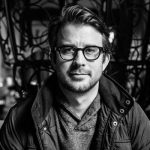Podcast: Play in new window | Download
Subscribe: Apple Podcasts | Android | RSS

Today’s interview is with Aaron Dignan, founder of The Ready, an organization design and transformation firm, and author of a new book: Brave New Work: Are You Ready to Reinvent Your Organization? Aaron joins me today to talk about the book, the core problem it is trying to address, the idea of organizational debt, what’s stopping you from doing the best work of your life and some of the biggest problems they have faced in helping firms transform the way they work.
This interview follows on from my recent interview – Analytics isn’t something you buy, it is something that you do – Interview with Larry Skowronek of NICE – and is number 296 in the series of interviews with authors and business leaders that are doing great things, providing valuable insights, helping businesses innovate and delivering great service and experience to both their customers and their employees.
Here’s the highlights of my chat with Aaron:
- The book is one part manifesto and one part playbook.
- The core problem with organizations these days is that the way we work was invented on a factory floor 100 years ago and it separated the thinking from the doing, the managers from the employees and was centred around an approach of control, compliance, hierarchy, red tape and really bureaucratic boundaries as a way to maintain control and ensure productivity and efficiency.
- However, this system is broken.
- This is evidenced by the fact that one in two people is thinking about quitting their job and is disengaged.
- Aaron talks about organizations needing a new operating system (OS), where there are lots of different components and not only do you have to change more than one but they’re all very interdependent.
- You can motivate change not just by creating dissatisfaction but also with curiosity about what’s possible.
- Great question from the book: What’s stopping you from doing the best work of your life?
- This is not new thinking, it’s fringe thinking. It’s thinking that’s been there for a long time.
- Taiichi Ono “think for yourself and stop trying to borrow wisdom.”
- Steve Blank, one of the Lean Start Up pioneers came up with the idea of Organizational Debt.
- Organizational Debt, like financial or technical debt, are things in our organization whether they be structures or policies or processes ….things that we’ve made decisions about that are no longer serving us and kind of sit on the balance sheet and really tax us.
- This is compounded by the age of an organization as everyone has a job to continue to add things to protect us and prevent problems and ensure success etc. But, no one is charged with taking things away.
- One way to think about it is it is like friction in a system. Friction is the interest rate.
- If it creates tension/friction and it slows things down then that’s the interest that you’re paying on the policy.
- Example in practice: The Ready worked with one one leadership team in a fairly large company in the educational space. They were thinking hard about growth but were struggling a little bit on vision. One of the main reasons was that they had no time to think about this due to having meetings all off the time. The Ready suggested a two week meeting moratorium to see how it felt, what they missed and what hurts. After eight weeks of practice and layering in the things that they needed to they achieved a 3 times improved rhythm in terms of time commitment and discipline.
- One of the best things you can do is start by stopping something.
- In one project they measured surprising things like ‘smiles in the hallway’ instead of productivity to check if the vibe was right and what was happening at an emergent cultural level.
- Greatness is not easy.
- One of the metaphors in the book is the difference between a lighted intersection and a roundabout. A roundabout is empirically better in almost every way. However, most people prefer lighted intersections as they are being controlled. Told what to do. At a roundabout you have to be on, you are responsible and you have to be present.
- The number one challenge for transforming the way people work is to create the space and time for this work.
- Two things to get started:
- 1. Conversation
- Have a conversation with your team and say: If you could change something what would you change? What’s stopping you from doing the best work of your life? Just ask the question, have the conversation without a promise of what will happen next. Just to see what’s in everybody’s head.
- 2. Activity
- At the end of the next project or the end of the next month, whichever comes first, grab the team and do a retrospective. That means getting everybody together and holding a retrospective. Aaron recommends using Parabol (https://www.parabol.co/) to help with this but there’s 15 different ways to do it. Just Google it. Essentially, you are asking the question: what worked, what didn’t work and what would we do differently next time we do this thing.
- 1. Conversation
- Less than 5 percent of teams do effective regular retrospectives.
- So, you can be in the top 5 percent pretty easily. You just have to do one.
About Aaron
 Aaron Dignan is the founder of The Ready, an organization design and transformation firm that helps institutions like Johnson & Johnson, Charles Schwab, Kaplan, Microsoft, Lloyds Bank, Citibank, Edelman, Airbnb, Cooper Hewitt Smithsonian Design Museum, and charity: water change the way they work. He is a cofounder of responsive.org, an investor in purpose-driven startups, and a friend to misfit toys. He lives in Colorado with his wife and son.
Aaron Dignan is the founder of The Ready, an organization design and transformation firm that helps institutions like Johnson & Johnson, Charles Schwab, Kaplan, Microsoft, Lloyds Bank, Citibank, Edelman, Airbnb, Cooper Hewitt Smithsonian Design Museum, and charity: water change the way they work. He is a cofounder of responsive.org, an investor in purpose-driven startups, and a friend to misfit toys. He lives in Colorado with his wife and son.
Check out The Ready, grab a copy of Brave New Work: Are You Ready to Reinvent Your Organization?, say Hi to Aaron and The Ready on Twitter @theready and @aarondignan and connect with Aaron on LinkedIn here.
Thanks: Image by Engin_Akyurt on Pixabay



